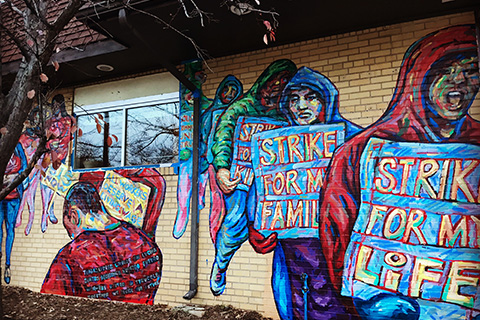
As a funder in the human trafficking space, I’ve learned a few things. If you want to know how exploitation happens, talk to a survivor. To find real solutions to the problem, work with organizers from those communities most impacted. And be willing to truly listen and act on what you hear. From wage theft to sexual exploitation to the worst forms of trafficking, the voices of the people being affected must be at the center of the call for change and the solutions that follow.
In the context of today’s increasing attacks on organized labor, immigrants, and LGBTQ people – and a historic lack of inclusion of survivor voices – now is the time for the anti-trafficking movement to double down on its support for those most impacted and to follow their lead. Pathways to Freedom’s newest grassroots and survivor grants aim to support organizations that have the ability to reach and organize communities vulnerable to exploitation, with a lens towards addressing economic and other social injustices that are often at the root of exploitation.
Pathways to Freedom’s program calls on cities to take urgent action to address the root causes of human trafficking and to ensure survivors get the services they need. It provides funds and expertise to support three primary sets of actors to take action – city governments, grassroots organizations, and survivors.
While our grassroots grantees’ advance reform differently, they are each powerfully worker-driven. In Minneapolis, Pathways will support Centro de Trabajadores Unidos en la Lucha (CTUL) to expand their outreach in industries such as construction where there are frequent violations of workers’ rights. CTUL recently played a pivotal role in bringing one of the state’s first labor trafficking cases to the courts. The grant also supports CTUL’s partnership with The Awood Center, a new worker center housed within the Minnesota Council on American Islamic Relations that is focused on workplace rights outreach to the Twin Cities’ large East African diaspora community.
In Chicago, Pathways will work with Raise the Floor Alliance, a network that includes ARISE and seven other worker centers, to support day to day organizing and bolster labor enforcement practices. The Alliance will work with the city on one of the first co-enforcement strategies implemented between city government and worker centers.
And what if a city doesn’t have a robust grassroots community organizing low-wage workers? You invest in laying some of the groundwork. In Atlanta, Pathways is partnering with the National Economic and Social Rights Initiative (NESRI). NESRI has a long history of supporting diverse workers movements and organizations throughout the U.S. and abroad – including the Fair Food Standards Council, Coalition of Immokalee Workers, the Bangladesh Accord, Migrant Justice (Milk with Dignity Program), and CTUL. They will assess what is needed to start the first worker center in Georgia which would organize to address abuse and exploitation of low-wage workers.
Pathways also seeks to bolster survivor leadership by working alongside the Survivor Alliance, a new organization dedicated to supporting survivors’ agency and facilitating their involvement in anti-trafficking efforts. In addition to providing an assessment of survivor leadership in the cities of Atlanta, Chicago, and Minneapolis, the Survivor Alliance will identify a number of Survivor Alliance Fellows who will receive skill-building training and be connected to local officials in order to develop long-term relationships with city government officials.
Finally, and perhaps most importantly, all four partners will work to reach people who have been underserved by the systems meant to protect them—and who may even fear these systems—such as immigrant survivors, survivors of color, Indigenous survivors, LGBTQ youth, people with disabilities, and those struggling with addiction.
No one organization, city government, or individual can change the entire system on their own. They must each utilize the tools they have, be it the power of law and governance or the simple, necessary power to stand up and demand protection and freedom from exploitation. Pathways to Freedom seeks to support these voices to bring change at the local level.